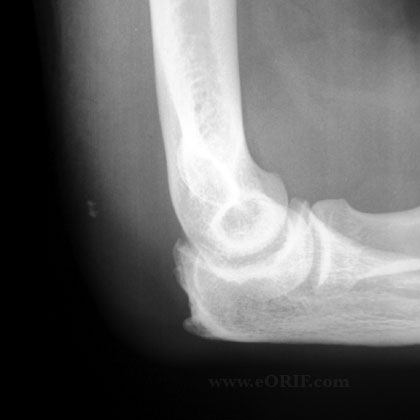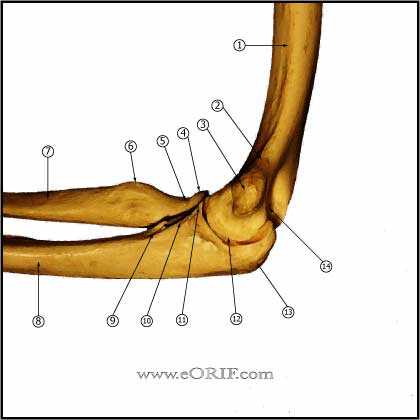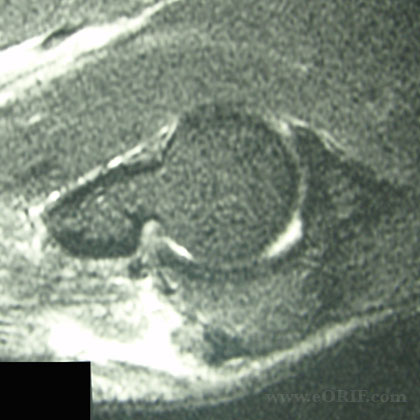|



|
synonyms: triceps avulsion, triceps tendon avulsion, triceps rupture
Triceps Rupture ICD-10
- S46.311A Strain muscle, fascia and tendon triceps, right arm, initial
- S46.312A Strain muscle, fascia and tendon triceps, left arm, initial
- S46.321A Laceration muscle, fascia and tendon triceps, right arm, initial
- S46.322A Laceration muscle, fascia and tendon triceps, left arm, initial
A- initial encounter
D- subsequent encounter
S- sequela
Triceps Rupture ICD-9
- 841.3 (Sprains and strains of ulnohumeral joint; includes rupture of tendon; excludes open laceration of tendon)
- 881.21 (open wound of elbow with tendon involvement)
Triceps Rupture Etiology / Epidemiology / Natural History
- Rare
- Generally men.
- Can occur from fall on outstretched arm, direct blow, laceration, or deceleration stress on a contracted triceps.
- MOI: deceleration force applied against an actively contracting triceps muscle.
- May occur spontaneoulsy with systemic diseases: hyperparathyroidism, or with chronic steriods for SLE.
Triceps Rupture Anatomy
- Distally the triceps tendon consists of two bands that join together above the elbow and insert into the posterior portion of the dorsal surface of the olecranon.
- The lateral band extends over the anconeus muscle inserting into the dorsal fascia of the forearm.
Triceps Rupture Clinical Evaluation
- Palpable depression just proximal to the olecranon. May have swelling and posterior ecchymosis.
- May continue to have active elbow extension due to the intact lateral expansion of the triceps with the anconeus.
Triceps Rupture Xray / Diagnositc Tests
Triceps Rupture Classification / Treatment
- Acute: primary repair indicated. Nonabsorbable suture placed through drill holes in the olecranon, consider hamstring autograft augmentation (Weistroffer JK, JSES 2003;12:193).
- Chronic: Triceps repair with augmentation. Consider anconeus rotation flap, or Achilles tendon allograft, or hamstring allo/autograft (Weistroffer JK, JSES 2003;12:193).
- CPT = 24341 (repair, tendon or muscle, upper arm or elbow, each tendon or muscle)
Triceps Rupture Associated Injuries / Differential Diagnosis
Triceps Rupture Complications
- Rerupture
- Infection
- Stiffness / flexion contracture
- CRPS
- HO
- Compartment Syndrome (Brumback RJ, JBJS 1987;69A:1445)
Triceps Rupture Follow-up Care
- Posterior splint in 40° of flexion for 2-3 weeks.
- 3weeks: start active ROM exercises
- 6weeks: progressive strengthening.
- Full recovery is variable; dependent on patient co-morbidities and tendon quality at repair.
Triceps Rupture Review References
|



